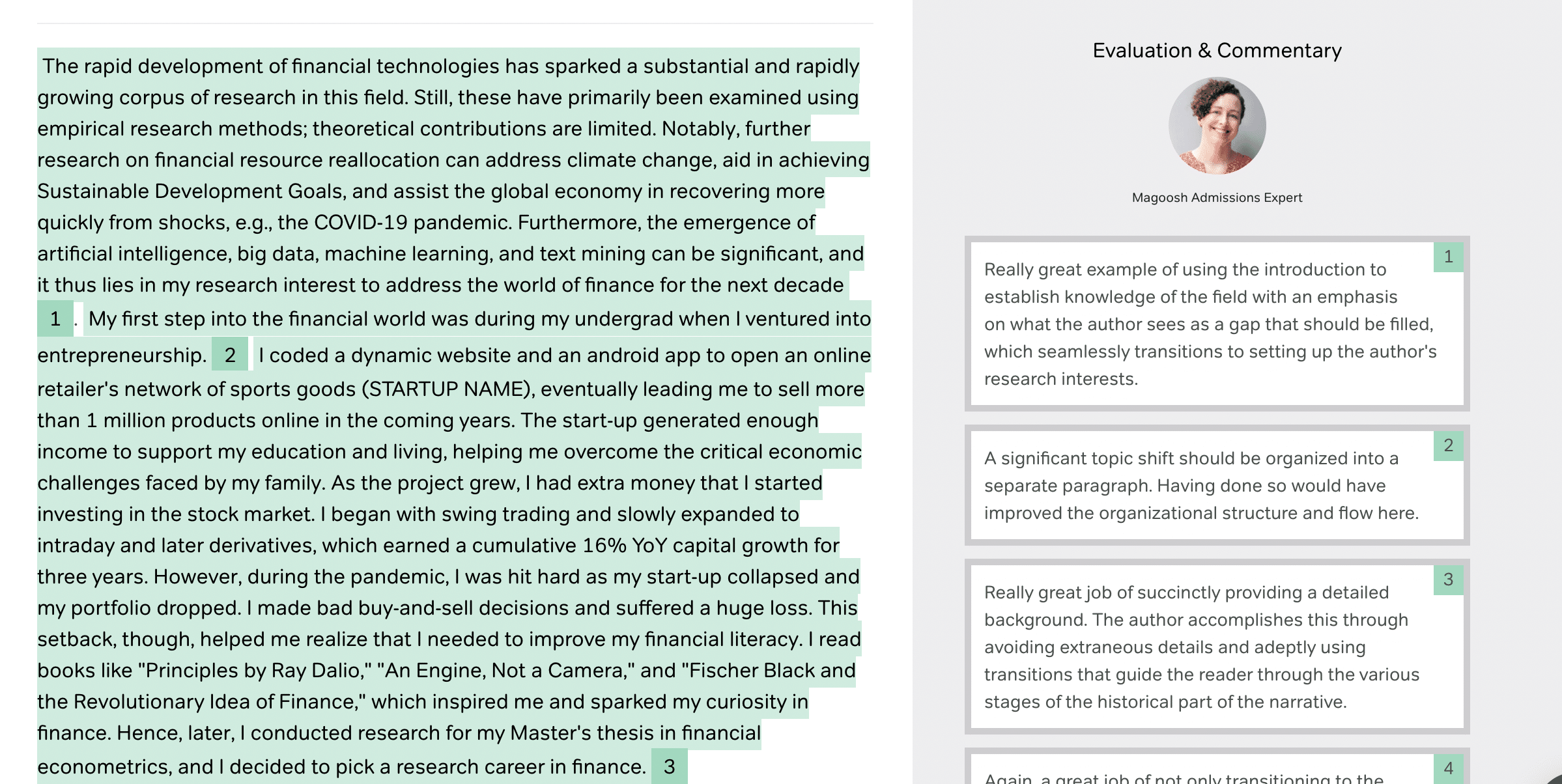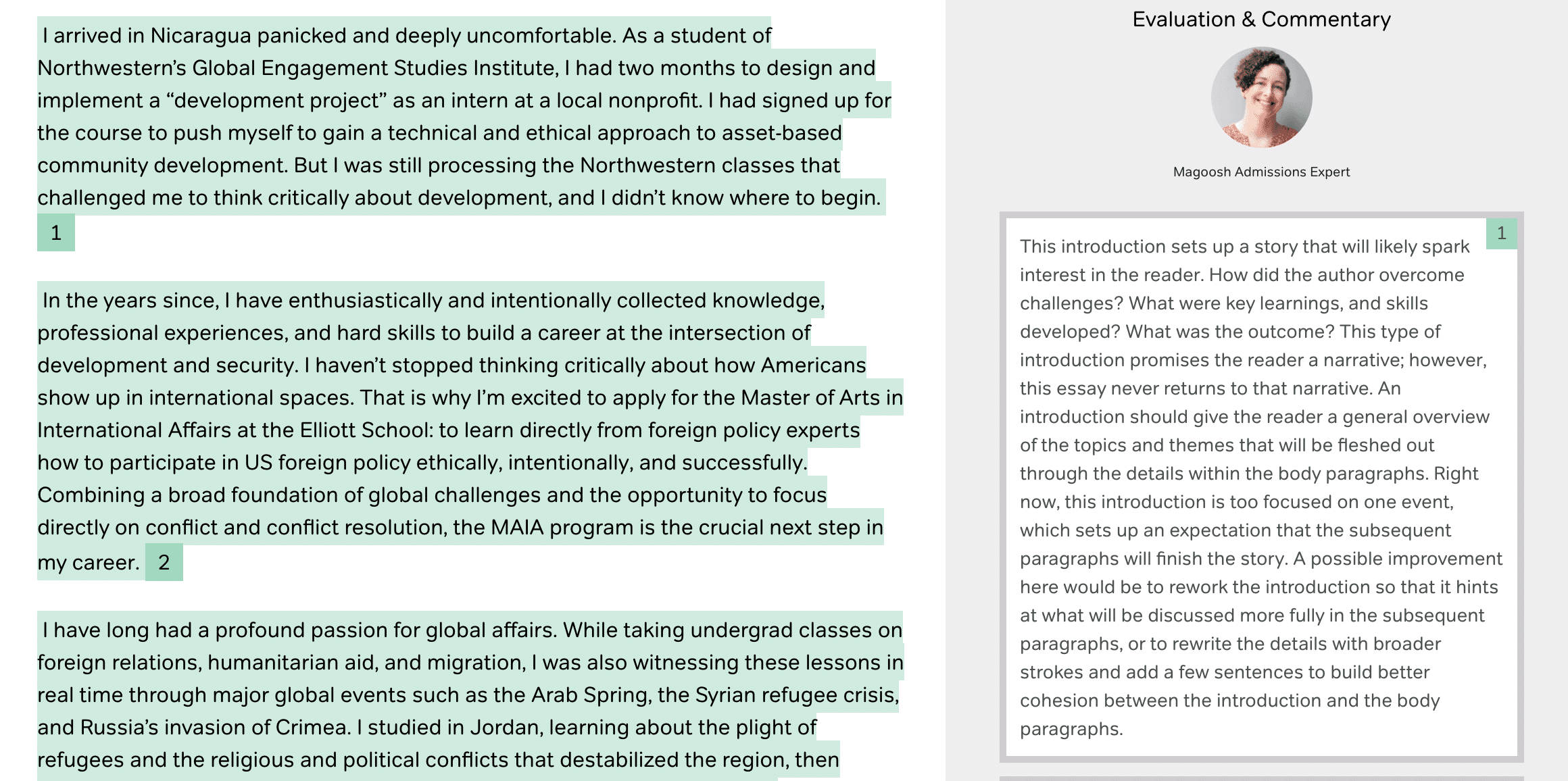
Your personal statement should demonstrate that you have thought deeply about why you are making the decision to go to grad school and that you are an excellent fit for your target school. Sound a little challenging? Don’t worry, these personal statement examples will break down the strategy of writing a strong graduate school application.
Comparing Graduate School Personal Statement Examples
Below I will share two examples of personal statements. The first has a strong writing approach, but the second lacks clarity and may cause confusion for its reader. Then I will describe the strengths and weaknesses of each example.
Introduction Paragraph Examples:
Ex. 1-Strong) The ocean is as fundamental to our lives as any other ecological habitat, so why don’t we have systems in place to treat it that way? Growing up in Monterey, California I was first introduced to marine biology through my advanced placement biology class. While in community college I helped form a student-led monthly beach clean-up team. This rewarding experience led me to pursue an undergraduate degree in Biology with an emphasis in ocean preservation. My passion for developing innovative and culturally informed approaches to marine preservation on a global scale have led me to pursue a doctorate in the field of marine biology. My desired research focus will explore solutions to the impacts of micro plastics in our ocean.
Ex. 2-Weak) Yea sure, the ocean is in a devastated condition, but what are we going to do about it? Well, with my degree in bio I plan to get a PhD in marine biology to help figure out how to address micro plastics in our ocean. I know so much already, and I just know that with a PhD I will be able to contribute on a greater scale. I know the PhD is a lot of work, but I am pretty sure I will be able to complete the program and have a great time doing so. I have always wanted to live in Santa Barbara, and that is definitely a part of my decision to apply to your program.
Diving Deeper Into Personal Statement Introductions
So, let’s discuss the strengths and weaknesses of the example introductions above!
Introduction Paragraph “Strong” Example:
- A captivating hook is provided that gives insight about the applicants research interests right away (ocean preservation).
- The introduction paragraph briefly describes research and volunteer experience of the applicant. This signals to the reader that they are both prepared. It also shows they have a direction that they intend to take their research.
- Throughout the paragraph the applicant demonstrates that they have been involved with marine biology since high school. This is important because it demonstrates their commitment to the field early on in the essay.
Introduction Paragraph “Weak” Example:
- The applicant does provide a hook in the form of a question. However, it is overly casual and the tone is not professional enough for graduate school applications. Same thing goes for abbreviations such as “bio”.
- The applicant is emphasizing that they “know so much”. For the sake of graduate school applications it is important to prioritize displaying a humble and gracious demeanor. This will demonstrate that you understand you have more to learn.
- The applicant mentions a desire to live in Santa Barbara. While it may be true, it is not a strong enough reason to pursue a PhD and signals to the admissions committee that you may be pursuing the program for the wrong reasons. Keep details like this out of your personal statement and focus on reasons for applying that are academically motivated.
Conclusion Paragraph Examples:
Ex. 1-Strong) As a first generation college student, and an English language learner, my journey to receive my bachelors of science in marine biology has been tough. Along the way I have developed leadership skills, research and lab experience, as well as a refined passion for the work that marine biologists are able to do when informed by the local community members. I desire to continue my studies with an emphasis on ocean preservation research through the innovative and unique PhD program offered at UC Santa Barbara. It would be an honor to work with Dr. Jonas Mendoza and Dr. Raquel Pacheco, two professors whose work aligns with my research interests and who have been welcoming and encouraging through our email correspondence. While my research goals are ambitious, I am confident that your program offers the resources and mentorship required for a unified effort to resolve the impact that microplastics have on not only human life, but all marine animals and ecosystems.
Ex2. -Weak) I think it’s a miracle that I even completed my B.S degree! That’s how I know that with the funding and laid back atmosphere at UC Santa Barbara I can definitely complete the PhD. I’m not so interested in the teaching part, or the amount of course work I would be required to take, but I just know that once I get out there and get into the water, it will all be worth it. My research experience is competitive and top-notch, I am a great person to work with and easily make friends. I am hopeful to hear back and excited for the next steps! Thanks for reading this far.
Conclusion Paragraph “Strong” Example
- The first two sentences are reiterating some of the major points that the applicant would have provided details about in the body of the essay. This helps the reader to remember your key points.
- The applicant also re-emphasizes who they would like to work with and that they have been in communication with them. This is a very important detail and one that will set them apart from other applicants who have not made the effort to do so. It is worth concluding with.
- The applicant concludes by mentioning the importance of a “unified effort” for their research goals. This goes a long way to demonstrate that they understand how important collaborative effort is. This helps make an applicant more attractive in the eyes of an admissions committee that must also consider the work ethic of all applicants.
Conclusion Paragraph “Weak” Example:
- The applicant describes their success in undergrad as a “miracle”. While they may feel this way, this language does not emphasize the skills and qualities they possess that can benefit their future studies.
- The applicant mentions what they are not interested in. As a rule of thumb, do not use the valuable space you have in your personal statement to mention anything negative, even if there are aspects about graduate school you are not thrilled about. Focus on what you are academically motivated by.
- The applicant describes their research experience as “competitive and top-notch”. Even if you have the most impressive CV, focus instead on listing what you have done, with who and what the outcomes were. Let the admissions committee decide how they interpret it.
Putting it all Together: Successful SOP Examples
Here are two SOPs from graduate students who are embarking on distinct academic adventures. Their stories are annotated with expert feedback from our seasoned admissions consultant.
Statement of Purpose #1: First, this SOP for SUNY Buffalo explores finance, showcasing a passion for financial markets and their global impact. It recounts overcoming challenges and making innovative contributions to financial econometrics, highlighting resilience and curiosity. Our experts spotlight its strengths, including a strong narrative and detailed examples, and suggest areas for refinement to enhance clarity and impact.
Statement of Purpose #2: Secondly, this statement of purpose for Tufts explores international affairs, showing a dedication to ethical global development and security. It traces the applicant’s journey from a pivotal experience in Nicaragua to a dedicated career in development and security. Our experts emphasize the engaging storytelling and focused narrative, recommending adjustments for consistency and depth to boost its persuasive impact.
So, what makes a good personal statement?
Your personal statement is one of many that an admissions committee will read, all to identify the strongest applicants. Remember, the committee members haven’t met you yet. They rely solely on your application materials to form their first impression. Leaving out crucial details is not an option.
Many students find it hard to talk about themselves, often worrying it might seem like bragging. But overcoming that discomfort is essential. Think of your personal statement as your first chance to introduce yourself to the committee. Make it count by addressing the following key points:
Who are you?
While your personal statement should personalize and humanize you as an applicant, remember that you’re more than just your GPA and transcripts. Admissions committees know this. However, every detail you include must work towards crafting a profile that appeals to the committee.
Are you a good fit?
What makes you prepared for the program? When discussing your academic background, be specific about what has prepared you for this program. Don’t miss the chance to showcase what sets you apart from other applicants by highlighting your years of hard work.
Demonstrating your fit can be challenging, especially if you’re changing careers or pursuing a new field. However, if you qualify to apply, ensure your writing clearly connects your current experience to your goals within the program. Don’t assume the committee will understand how your work relates—spell out every connection and detail for them.
Demonstrate that you understand appropriate and professional boundaries:
One of the most common questions my undergraduate students ask when applying to graduate school is, “How much personal information should I include in my application?” The answer: only as much as you’re comfortable sharing and only information that intentionally shapes the profile of an ideal candidate.
I advise against taking risks by including jokes, controversial opinions not already addressed by the program, or references that might cause confusion or be off-putting. Keep your focus on crafting a strong, professional profile.
What do you intend to accomplish/contribute to the field?
The admissions committee wants to know: if you’re admitted to the program, then what? Be clear about your goals and don’t shy away from specifics. What’s your “end goal”? If you know it, include it in your essay. If you’re still figuring it out, describe what you’re working towards more broadly.
However, avoid language that suggests uncertainty about whether graduate school is right for you. Always write with confidence, showing that you’re sure of your decision, even if you’re still considering your options for after graduation.
Why now?
Admissions committees have been through graduate school themselves. They know it’s not a choice made just because “you don’t know what else to do.” Show that you’re ready for the commitment and hard work by clearly explaining why you’ve decided that graduate school is the best option for you right now. Highlight how your current and past experiences align with your intentions if admitted into the program.
A strong personal statement will address all these questions while respecting appropriate boundaries. Ultimately, it will show the committee that you are prepared for the program, likely to succeed if admitted, and deeply committed to a career where the training and degree you’ll receive are crucial to your future goals.
Summary and Tips
The personal statement is usually just 1-2 pages. With a document this short and with so much importance towards your chances of admission, every word matters! Consider these takeaways and do your research at every stage of the writing process.
Brainstorm
Before you start writing, gather all the information you’ll need. Pull details from this blog post, the program’s official website, and any correspondence with professors or graduate students at each program you’re applying to. Create a document listing every experience and detail you want to include. Use this as a reference while writing to ensure you cover every important point.
Proofread
Don’t skip this step! Reach out to current graduate students or a writing service for feedback. Double-check your work for any language that’s too casual or might be off-putting or concerning to those reviewing your application.
Stand Out
Remember, admissions committees are made up of real people who read countless applications. Do your best to stand out by highlighting what truly sets you apart and the skills you’ve developed that are relevant to the program. Once you have your first draft, refine your language to be both professional and captivating. Don’t forget to add a little flair!
Getting More Help
The graduate application process is a stressful one and can seem overwhelming if you don’t have the right support. We’re here to help guide you through all steps on your journey to graduate school. Check out our blog for more information and tips on the GRE and graduate admissions. If you haven’t taken your GRE yet, take a free practice test to jumpstart your test prep. Consider a Magoosh Premium Plan to access expert support, real ETS questions, and real application essay examples. We’re here to help!







